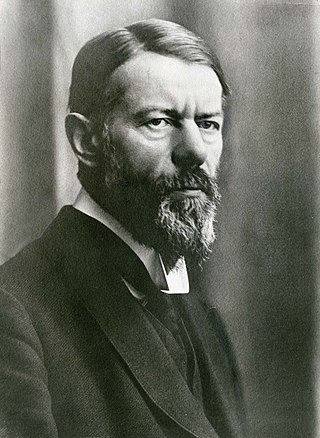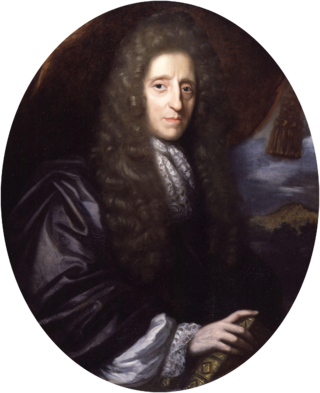
Maximilian Karl Emil Weber was a German sociologist, historian, jurist, and political economist who was one of the central figures in the development of sociology and the social sciences more generally. His ideas continue to influence social theory and research.

Authority is commonly understood as the legitimate power of a person or group over other people. In a civil state, authority is practiced by the legislative, executive, and judicial branches of government. The term authority has many nuances and distinctions within various academic fields ranging from sociology to political science.

A duty is a commitment or expectation to perform some action in general or if certain circumstances arise. A duty may arise from a system of ethics or morality, especially in an honor culture. Many duties are created by law, sometimes including a codified punishment or liability for non-performance. Performing one's duty may require some sacrifice of self-interest.
In the field of sociology, charismatic authority is a concept of organizational leadership wherein the authority of the leader derives from the personal charisma of the leader. In the tripartite classification of authority, the sociologist Max Weber contrasts charismatic authority against two other types of authority: (i) rational-legal authority and (ii) traditional authority.

A bureaucrat is a member of a bureaucracy and can compose the administration of any organization of any size, although the term usually connotes someone within an institution of government.

Political sociology is an interdisciplinary field of study concerned with exploring how governance and society interact and influence one another at the micro to macro levels of analysis. Interested in the social causes and consequences of how power is distributed and changes throughout and amongst societies, political sociology's focus ranges across individual families to the state as sites of social and political conflict and power contestation.

Organizational theory refers to a series of interrelated concepts that involve the sociological study of the structures and operations of formal social organizations. Organizational theory also seeks to explain how interrelated units of organization either connect or do not connect with each other. Organizational theory also concerns understanding how groups of individuals behave, which may differ from the behavior of an individual. The behavior organizational theory often focuses on is goal-directed. Organizational theory covers both intra-organizational and inter-organizational fields of study.

In political science, legitimacy is the right and acceptance of an authority, usually a governing law or a regime. Whereas authority denotes a specific position in an established government, the term legitimacy denotes a system of government—wherein government denotes "sphere of influence". An authority viewed as legitimate often has the right and justification to exercise power. Political legitimacy is considered a basic condition for governing, without which a government will suffer legislative deadlock(s) and collapse. In political systems where this is not the case, unpopular regimes survive because they are considered legitimate by a small, influential elite. In Chinese political philosophy, since the historical period of the Zhou dynasty, the political legitimacy of a ruler and government was derived from the Mandate of Heaven, and unjust rulers who lost said mandate therefore lost the right to rule the people.

"Politics as a Vocation" is an essay by German economist and sociologist Max Weber (1864–1920). It originated in the second lecture of a series he gave in Munich to the "Free Students Union" of Bavaria on 28 January 1919. This happened during the German Revolution when Munich itself was briefly the capital of the Bavarian Socialist Republic. Weber gave the speech based on handwritten notes which were transcribed by a stenographer. The essay was published in an extended version in July 1919, and translated into English only after World War II. The essay is today regarded as a classic work of political science and sociology.
Rational-legal authority is a form of leadership in which the authority of an organization or a ruling regime is largely tied to legal rationality, legal legitimacy and bureaucracy. The majority of the modern states of the twentieth and twenty-first centuries are rational-legal authorities, according to those who use this form of classification.
Patrimonialism is a form of governance in which all power flows directly from the ruler. There is no distinction between the public and private domains. These regimes are autocratic or oligarchic and exclude the lower, middle and upper classes from power. The leaders of these countries typically enjoy absolute personal power. Usually, the armies of these countries are loyal to the leader, not the nation.
The German sociologist Max Weber (1864-1920) distinguished three ideal types of legitimate political leadership/domination/authority . He wrote about these three types of domination both in his essay "The Three Types of Legitimate Rule", which was published in his 1921 masterwork Economy and Society, and in his classic 1919 speech "Politics as a Vocation" :
- charismatic authority,
- traditional authority and
- rational-legal authority.

Filial piety is the virtue of exhibiting love and respect for one's parents, elders, and ancestors, particularly within the context of Confucian, Chinese Buddhist, and Daoist ethics. The Confucian Classic of Filial Piety, thought to be written around the late Warring States-Qin-Han period, has historically been the authoritative source on the Confucian tenet of filial piety. The book—a purported dialogue between Confucius and his student Zengzi—is about how to set up a good society using the principle of filial piety. Filial piety is central to Confucian role ethics.

A proconsul was an official of ancient Rome who acted on behalf of a consul. A proconsul was typically a former consul. The term is also used in recent history for officials with delegated authority.
In political science, sultanism is a form of authoritarian government characterized by the extreme personal presence of the ruler in all elements of governance. The ruler may or may not be present in economic or social life, and thus there may be pluralism in these areas, but this is never true of political power.
Neopatrimonialism is a system of social hierarchy where patrons use state resources to secure the loyalty of clients in the general population. It is an informal patron–client relationship that can reach from very high up in state structures down to individuals in small villages.

Legitimation crisis refers to a decline in the confidence of administrative functions, institutions, or leadership. The term was first introduced in 1973 by Jürgen Habermas, a German sociologist and philosopher. Habermas expanded upon the concept, claiming that with a legitimation crisis, an institution or organization does not have the administrative capabilities to maintain or establish structures effective in achieving their end goals. The term itself has been generalized by other scholars to refer not only to the political realm, but to organizational and institutional structures as well. While there is not unanimity among social scientists when claiming that a legitimation crisis exists, a predominant way of measuring a legitimation crisis is to consider public attitudes toward the organization in question.
Fēngjiàn was a governance system in Ancient China and Imperial China, whose social structure formed a decentralized system of confederation-like government. The ruling class consisted of the Son of Heaven and aristocracy, and the lower class consisted of commoners categorized into four occupations. Elite bonds through affinal relations and submission to the overlordship of the king date back to the Shang dynasty, but it was the Western Zhou dynasty when the Zhou kings enfeoffed their clan relatives and fellow warriors as vassals. Through the fengjian system, the king would allocate an area of land to a noble, establishing him as the ruler of that region and allowing his title and fief to be legitimately inherited by his descendants. This created large numbers of local autonomous dynastic domains.
In a notable study of power conducted by social psychologists John R. P. French and Bertram Raven in 1959, power is divided into five separate and distinct forms. They identified those five bases of power as coercive, reward, legitimate, referent, and expert. This was followed by Raven's subsequent addition in 1965 of a sixth separate and distinct base of power: informational power.
Feudalism in contemporary Pakistan usually refers to the power and influence of large landowning families, particularly those with very large estates in more remote areas. The adjective "feudal" in the context of Pakistan has been used to mean "a relatively small group of politically active and powerful landowners." "Feudal attitude" refers to "a combination of arrogance and entitlement." According to the Pakistan Institute of Labor Education and Research (PILER), 5% of agricultural households in Pakistan own nearly two-thirds of Pakistan's farmland.












